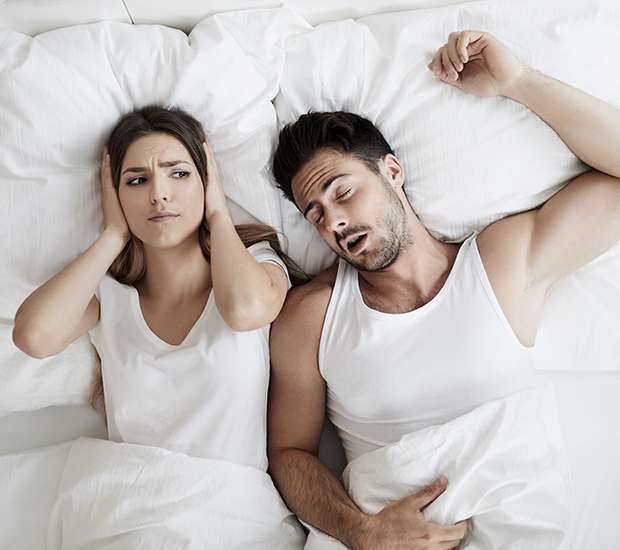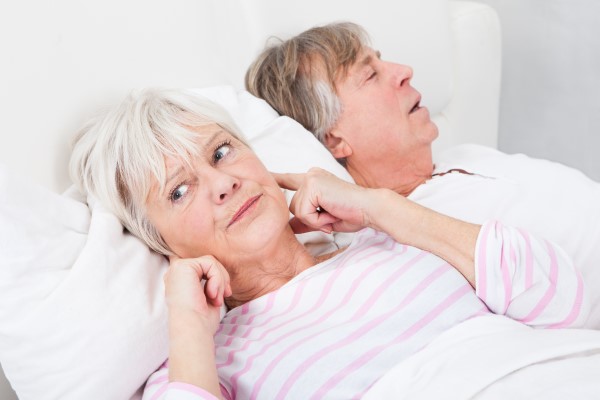Sleep Apnea Treatment Huntersville, NC
Sleep apnea is a common yet serious sleep disorder that affects many people in Huntersville, NC, and the surrounding areas including Cornelius, Davidson, Mooresville, and Charlotte. It occurs when your airway becomes partially or completely blocked during sleep, causing pauses in breathing and disrupting your sleep cycle. This condition can leave you feeling tired, irritable, and unfocused during the day.
If left untreated, sleep apnea can lead to serious health complications including high blood pressure, heart disease, stroke, diabetes, and even memory problems. Our trusted Huntersville, NC dentist, Dr. Scott Guice, specializes in dental sleep medicine and offers personalized sleep apnea solutions designed to improve both your sleep quality and overall health.
Many people assume sleep apnea only affects older adults or people who are overweight, but it can affect anyone. Men and women of all ages, including children, can experience this condition. Recognizing the symptoms and seeking treatment early is essential for long-term health and wellness. If you’re experiencing restless nights, contact our Huntersville dental office by calling (704) 895-3858.
Sleep Apnea QuizWhy Choose Dr. Scott Guice for Sleep Apnea Treatment
Dr. Scott Guice is not only a skilled Huntersville dentist but also a certified Diplomate of the American Board of Dental Sleep Medicine. This certification reflects his advanced training and expertise in treating sleep disorders with safe and effective dental solutions.
Dr. Guice combines his deep knowledge of dental health with specialized training in sleep medicine to create custom treatment plans tailored to each patient’s needs. Whether you are seeking an alternative to CPAP therapy or need a comfortable oral appliance, Dr. Guice ensures that your treatment is both effective and comfortable.
Patients appreciate Dr. Guice’s approachable and thorough style. He takes time to explain your treatment options, answer your questions, and provide ongoing support. This personalized approach makes Lake Norman Dentistry the leading choice for sleep apnea treatment in Huntersville and nearby communities.
What is Sleep Apnea?
Sleep apnea is a common sleep disorder that interrupts normal breathing during sleep. People with this condition experience repeated pauses in breathing, which can last from a few seconds to over a minute. These interruptions prevent restful sleep and reduce oxygen levels in the body, leading to fatigue, difficulty concentrating, and other health complications.
Types of Sleep Apnea
Sleep apnea is not a one-size-fits-all condition. There are three main types you may be diagnosed with. While all interfere with your breathing during sleep, each type does so in a different way. Understanding the differences can help you recognize symptoms and seek the right treatment.
Obstructive Sleep Apnea (OSA)
Obstructive Sleep Apnea occurs when the tissue in the mouth and throat collapses into the airway during sleep, making it difficult to breathe freely. This often causes loud snoring or the sensation of choking while asleep, as your body struggles to get enough air. Excess tissue in the throat, which can be influenced by obesity, is a common risk factor for OSA. Oral appliance therapy provided by a dentist can be highly effective in managing this type of sleep apnea.
Central Sleep Apnea (CSA)
Central Sleep Apnea is different because the brain fails to send proper signals to the muscles responsible for breathing. This pause in communication prevents normal breathing and is not caused by airway obstruction. CSA is typically a secondary condition linked to another illness. Treatment often focuses on the underlying cause and may include lifestyle changes, medication, or a Continuous Positive Airway Pressure (CPAP) machine. CSA cannot be treated with dental devices.
Complex or Mixed Sleep Apnea (MSA)
Complex or Mixed Sleep Apnea occurs when a patient shows signs of both obstructive and central sleep apnea. Treatment usually requires a combination of approaches, which may include oral appliances for airway support and interventions targeting an underlying medical condition.
To accurately diagnose any form of sleep apnea, a sleep study is essential. These studies can be conducted at a dedicated sleep center or through home-based evaluation tools, allowing your sleep specialist to develop a tailored treatment plan that meets your needs.
Common Symptoms of Sleep Apnea
Sleep apnea can present itself in many ways, some of which may not be obvious. Common symptoms include:
- Loud and chronic snoring
- Pauses in breathing during sleep, often noticed by a partner
- Morning headaches or dry mouth
- Daytime fatigue and excessive sleepiness
- Difficulty concentrating or memory problems
- Irritability and mood changes
- Nighttime sweating
If you notice any combination of these symptoms, it is important to seek an evaluation from our sleep specialist in Huntersville by calling (704) 895-3858 as soon as possible. Early detection can prevent long-term health problems and improve your quality of life.
How Our Huntersville Dentist Diagnoses Sleep Apnea
Diagnosing sleep apnea begins with a thorough evaluation by a qualified sleep specialist or dentist trained in sleep medicine, like Dr. Scott Guice at Lake Norman Dentistry. The process typically starts with a review of your medical history, sleep habits, and any symptoms you or your partner may have noticed, such as loud snoring, gasping, or daytime fatigue.
The most definitive way to diagnose sleep apnea is through a sleep study. Sleep studies can be conducted in a dedicated sleep center or at home using specialized monitoring devices. During the study, various factors are measured, including breathing patterns, oxygen levels, heart rate, and brain activity. The results help determine the type of sleep apnea you have and the severity of the condition.
Once the diagnosis is confirmed, Dr. Guice can recommend a tailored treatment plan, which may include oral appliance therapy, lifestyle adjustments, or coordination with other healthcare providers to address underlying conditions. Early diagnosis is key to preventing long-term health complications and restoring restorative sleep.
Sleep Apnea Treatment Options Offered at Our Huntersville Dental Office
At Lake Norman Dentistry, we offer several treatment options for patients with sleep apnea. Each treatment is designed to be safe, effective, and tailored to individual needs.
Oral Appliance Therapy
One of the most popular treatments for mild to moderate sleep apnea is oral appliance therapy. Dr. Guice custom-designs a device that fits comfortably in your mouth while you sleep. This device gently repositions your jaw and tongue to keep your airway open, reducing snoring and improving oxygen flow.
CPAP Alternatives
Continuous positive airway pressure, or CPAP, is a common sleep apnea treatment, but many patients find it uncomfortable. Oral appliances serve as a convenient and effective alternative for those who struggle with CPAP machines.
Lifestyle Recommendations
In addition to dental devices, lifestyle changes can significantly improve sleep apnea symptoms. These may include weight management, quitting smoking, limiting alcohol intake, adjusting your sleep position, and establishing a consistent sleep schedule. Dr. Guice will work with you to create a comprehensive plan that fits your lifestyle.
Regular Follow-Up and Monitoring
Treatment for sleep apnea is not one-size-fits-all. Dr. Guice monitors your progress and makes adjustments as needed to ensure your therapy remains effective. Follow-up appointments allow us to track improvements in your sleep quality, overall health, and daytime energy levels.
Frequently Asked Questions
How do I know if I have sleep apnea?
Sleep apnea often goes undiagnosed because its symptoms occur during sleep. Common signs include loud snoring, pauses in breathing noticed by a partner, morning headaches, daytime fatigue, and trouble concentrating. A sleep study can confirm the diagnosis and help guide treatment.
Can a dentist really treat sleep apnea effectively?
Yes. Dr. Scott Guice is a certified sleep specialist in Huntersville. He provides oral appliance therapy and other dental solutions that have been clinically proven to reduce snoring and improve airflow for patients with mild to moderate sleep apnea.
Is the treatment comfortable?
Absolutely. Oral appliances are custom-made for each patient. They fit comfortably in your mouth and allow natural jaw movement while you sleep. Most patients adapt quickly and find that the devices significantly improve their sleep quality.
How long does it take to see results?
Many patients notice an improvement in sleep quality and reduced snoring within a few nights. Full benefits typically appear after several weeks of consistent use. Dr. Guice provides ongoing support to ensure optimal results for each patient.
Regain Your Energy with Effective Sleep Apnea Treatment
Sleep apnea should not control your life or your health. At Lake Norman Dentistry, Dr. Scott Guice, a certified Diplomate of the American Board of Dental Sleep Medicine, offers personalized solutions to help you breathe easier and sleep better. Whether you live in Huntersville, Cornelius, Davidson, Mooresville, or Charlotte, our dental office provides care designed to improve both your sleep quality and overall well-being.
Take the first step today toward better sleep and better health. Contact Lake Norman Dentistry by calling (704) 895-3858 to schedule your consultation with our sleep specialist in Huntersville, NC and discover the most effective sleep apnea treatment near you. With the right plan, you can reduce snoring, restore energy, and wake up feeling refreshed every morning.
To learn more about sleep apnea or discuss your oral health in general, call 704-895-3858 and schedule an appointment with our Huntersville dental office. At Lake Norman Dentistry, we are happy to discuss your health challenges and make recommendations, even if we have to refer you to a specialist for treatment.
Questions Answered on This Page
Q. Is sleep apnea a sleep disorder?
Q. What are the treatment options for sleep apnea?
People Also Ask
Definition of Dental Terminology
- Cosmetic Dentistry
- Cosmetic dentistry is generally used to refer to any dental work that improves the appearance (though not necessarily the function) of a person’s teeth, gums and/or bite.
- Decay
- Tooth decay is when the enamel of the tooth begins to decay and cause erosion from plaque and tartar on the teeth.
- Dental Caries
- Dental caries is also known as cavities and result from a lack of proper oral hygiene leaving plaque that forms tiny holes in the teeth.
- Dental Checkup
- A dental checkup is an appointment that involves cleaning the teeth, identifying any signs of infection and removing said signs of infection at least once every six months in the office.
- Dental Filling
- A dental filling involves restoring the structure of the tooth by using metal, alloy, porcelain or plastic to fill the tooth.
- Dental Prophylaxis
- A dental prophylaxis is a professional and detailed cleaning that involves the removal of plaque, calculus and stains from the teeth.
- Dental Sealants
- Dental sealants contain a resinous material that we apply to the chewing surfaces of the posterior teeth to prevent dental caries.
- Dentist
- A dentist, also known as a dental surgeon, is a doctor who specializes in the diagnosis, prevention, and treatment of diseases and conditions of the oral cavity.
- Gingivitis
- Gingivitis is the inflammation of gum tissue that results from plaque, other infections in the mouth and poor oral hygiene.
- Preventive Dentistry
- Preventive dentistry is the dentistry that focuses on maintaining oral health in order to prevent the spread of plaque, the formation of tartar and infections in the mouth.
- Tartar
- Tartar forms when plaque builds up on the surface of the teeth and calcifies into a hard surface that is much more difficult to remove and will require professional treatment.
- Tooth Enamel
- Tooth enamel is the protective visible outer surface of a tooth that contains the dentin and dental pulp.
Back to top of Do I Have Sleep Apnea?




